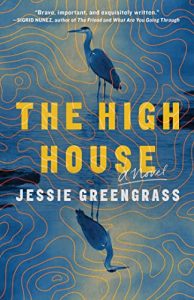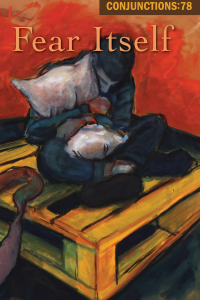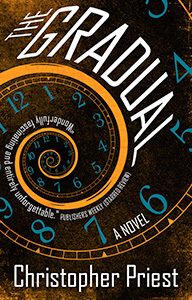Ian Mond reviews The High House by Jessie Greengrass
 The High House, Jessie Greengrass (Scribner 978-1-98218-011-9, $27.00, 272pp, hc) January 2022.
The High House, Jessie Greengrass (Scribner 978-1-98218-011-9, $27.00, 272pp, hc) January 2022.
While I have strong misgivings regarding the currency of killer-plague narratives (now that we’ve experienced a pandemic of our own), these qualms don’t extend to climate fiction. If anything, I feel there’s not enough contemporary climate-centric novels being published in genre spaces, aside from notable exceptions like Alexis Wright, James Bradley, Kim Stanley Robinson, and Jeff VanderMeer. I’d even go as far as to argue – based solely on instinct rather than documented fact – that it’s literary authors like Barbara Kingsolver, Megan Hunter, Jenny Offill and Lydia Millet (to name four) who’ve taken up the slack. Another case in point is Jessie Greengrass. Her second novel, The High House, is one of the more unsettling works I’ve read about the Anthropocene, a book that gravely describes the gradual, then sudden slide into climate catastrophe.
The titular High House rests on a slope near the ruins of what was once an English village. The three residents of the house, Sally, Caro (short for Caroline), and Pauly, are, as far as they know, the only survivors of the floods that have wiped out most of the United Kingdom. While tending to their small orchard, vegetable garden, and a dwindling number of chickens, Sally, Caro, and Pauly reflect on what has led them to this once neglected house. It’s a story about a famed scientist, Francesca, who travels the world investigating the increase in flooding across the planet. Francesca’s research and advocacy take her away from her toddler, Pauly, forcing her step-daughter, a bitter Caro, to take on the duties as a mother. But unbeknownst to Caro, in between Francesca’s sojourn overseas, she has been visiting the High House, a rundown property passed onto her by her Uncle and taken care of by ‘‘Grandy’’ and his grand-daughter Sally. With the foresight of what’s to come, Francesca funnels her money into the High House, repurposing the property as a sanctuary, loading the barn with enough supplies to last a decade (or more). It’s a project she’s undertaken not for herself or her husband (Caro’s father) but for the survival of her son.
Not since James Bradley’s Clade have I read a novel that’s attempted to chart our slide into climate chaos. I can’t vouch for Greengrass’s accuracy, whether the floods and droughts will occur as she portrays it, but her intent goes beyond fidelity to science. Instead, through the voices of Caro and Sally, Greengrass shows how, despite the growing number of bushfires, mudslides, and once-in-a century weather events, western society has come to treat global warming as background noise. ‘‘We had been watching people drown for years, [and]… they had always been a long way off from us.’’ Caro takes this a step further. She argues that society’s failure to act, to mitigate the effects of climate change, wasn’t so much due to a lack of care but because ‘‘there seemed nothing else to do.’’ It’s a frighteningly accurate depiction of our collective sense of helplessness and apathy, only exacerbated when we see those in actual power at the recent Climate Change Conference in Glasgow do the bare minimum while island nations beg for assistance.
Besides getting to the psychological nub of the current crisis, The High House is also a layered portrait of a mother’s impulse to protect and save her child from what’s to come. Both Sally and Caroline initially view Francesca as a remote figure who seems to have little time or patience for her family; however, they come to realise that the High House is a symbolic expression of Francesca’s love for Pauly. ‘‘In the end,’’ Sally remarks, ‘‘we always choose ourselves. Or our children. We are only here because Francesca couldn’t bear the thought of Pauly drowning.’’ While I generally loathe literature’s representation of the indifferent or estranged parent, in this instance, faced with the existential threat posed by climate change, I can absolutely understand why a parent might prioritise their child’s future, however limited, above that of spending quality time with them.
Ultimately, though, what I found so distressing about The High House is that it’s not a cautionary tale. Rather, it’s a horribly pragmatic depiction of human nature, one that recognises our inability to conceptualise a slow apocalypse. Or in Sally’s words: ‘‘after years of incremental alteration, you stand, surrounded by your accommodations, and wonder for the first time at the fact that everything should, somehow, have come to this.’’
Ian Mond loves to talk about books. For eight years he co-hosted a book podcast, The Writer and the Critic, with Kirstyn McDermott. Recently he has revived his blog, The Hysterical Hamster, and is again posting mostly vulgar reviews on an eclectic range of literary and genre novels. You can also follow Ian on Twitter (@Mondyboy) or contact him at mondyboy74@gmail.com.
This review and more like it in the January 2022 issue of Locus.
 While you are here, please take a moment to support Locus with a one-time or recurring donation. We rely on reader donations to keep the magazine and site going, and would like to keep the site paywall free, but WE NEED YOUR FINANCIAL SUPPORT to continue quality coverage of the science fiction and fantasy field.
While you are here, please take a moment to support Locus with a one-time or recurring donation. We rely on reader donations to keep the magazine and site going, and would like to keep the site paywall free, but WE NEED YOUR FINANCIAL SUPPORT to continue quality coverage of the science fiction and fantasy field.
©Locus Magazine. Copyrighted material may not be republished without permission of LSFF.







